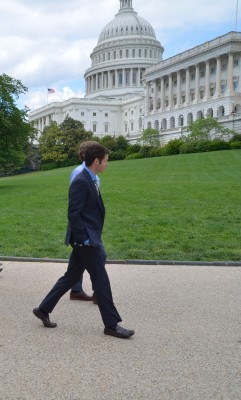Effective policy making requires a multifaceted and nuanced understanding of the world around us. Markets are global and economies are increasingly interdependent. As the world has grown closer, residents of Brazil, Syria, and China are now our next door neighbors. Tanks and planes aren’t the only consideration for the new policy entrepreneur. A clear view of the world is necessary to understand the international ramifications of decisions made in the United States.

BEE’s Trevor Corning
Brookings Executive Education recognizes the need for policy-focused courses with content that provides the economic, political and social perspectives in addition to the national security lens. Senior Program Manager, Ian Dubin, and Trevor Corning, Program Coordinator, have redesigned the curriculum for the Global and Regional Challenges courses with these nuances in mind.
Global Challenges, Threats, and Opportunities: U.S. Perspective articulates the issues broadly, giving the participants a framework in which to understand the regionally focused courses.
Each Regional Challenges, Threats, and Opportunities course has been designed to help participants understand the context and landscape of the U.S interests and geopolitics of each region. An increasingly globalized world requires a look at regional issues from a multifaceted perspective.
For example, the creation of policy impacting South and Central America is no longer simply a national security matter, i.e. border patrol. The Trans-Pacific Partnership (TPP) and Central America Free Trade Agreement (CAFTA) are influencing how we create national security policy as U.S. businesses aim to expand to local markets in countries that have positive relationships with the U.S. The surge in unaccompanied children from Central America has made the border a humanitarian issue.
The recent Chinese cyber-attacks on Middle East scholars at prominent think tanks and law firms in the United States are another example of the intersection of politics, society, economics, and security. As a large importer of oil, China is invested in the stability of the Middle East as well as the U.S.’s plans for strategic action as a matter of trade, international business and national security.
The economic, political and social climates of a region have become inextricably linked locally and globally.
Brookings Executive Education (BEE) explores these links in the following regions: East and South Asia, the Middle East, and South and Central America. BEE will add to the repertoire a fourth regionally focused course on Africa in 2015. Each course takes participants through the challenges, threats, and opportunities within the region providing information so they may more effectively craft policy, affect change, develop business, and work cohesively in and with that region.
Pictured above are: Cheng Li, director of the John L. Thornton China Center and a senior fellow in the Foreign Policy program at Brookings. He is also a director of the National Committee on U.S.-China Relations; and Ian Dubin, BEE Senior Program Manager.



